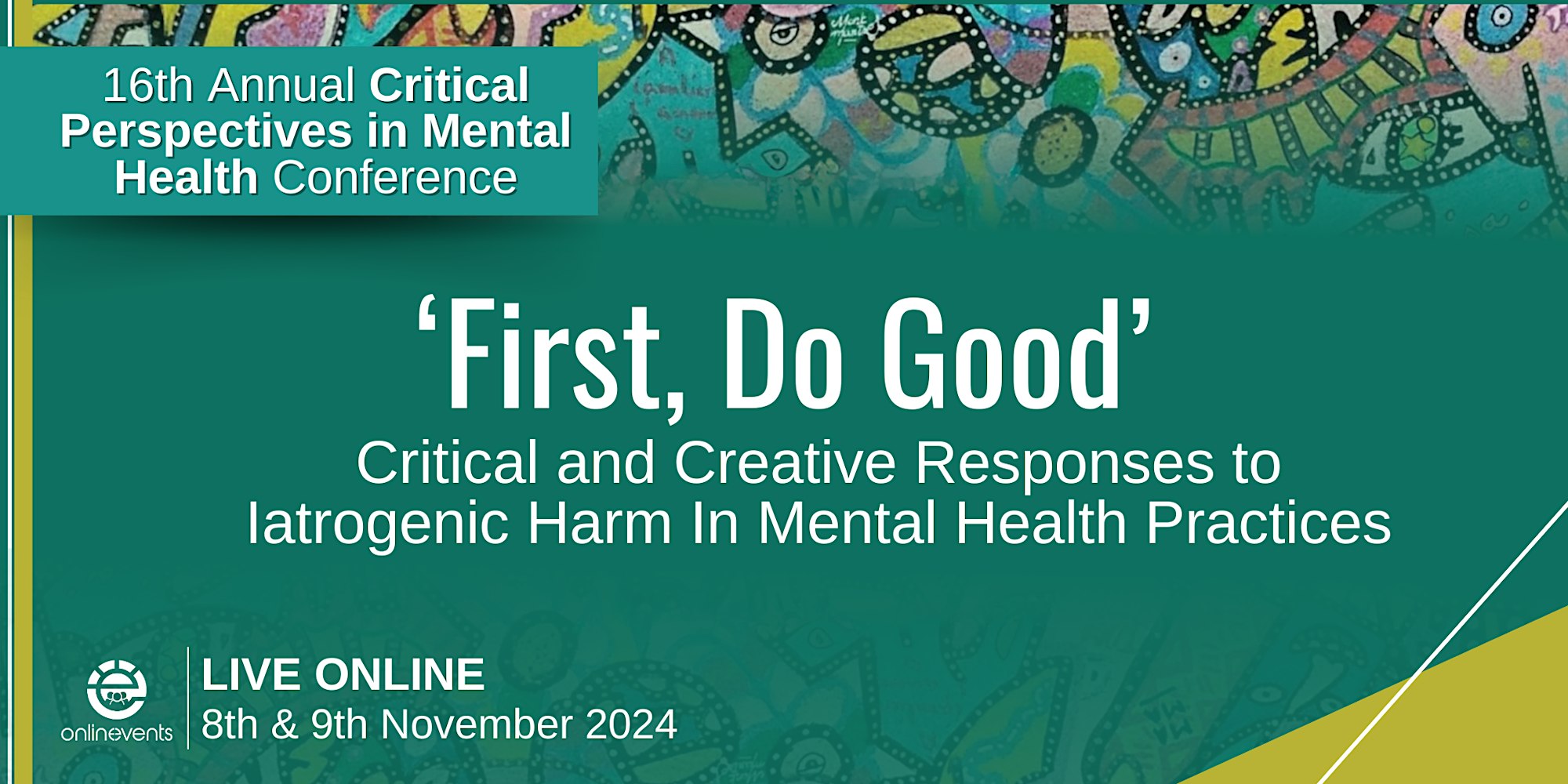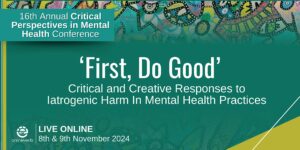About this event

DOWNLOAD THE KEYNOTE ONLINE PROGRAMME HERE
‘First, Do Good’: Critical and Creative Responses to Iatrogenic Harm In Mental Health Practices – 16th Annual Critical Perspectives in Mental Health Conference
‘First do no harm’ is considered a key ethical principle in health and social care practices. Yet, over the years, we have heard many accounts of harm caused by coercion, neglect, overmedication, adverse drug reactions, loss of dignity and agency from people who have used/are using mental health services.
Over the years, we have also become aware of professionals who are concerned about potentially harmful caregiving practices but are afraid to speak out. The term ‘iatrogenic harm’ articulates these concerns, referring to the damage caused inadvertently by treatment and care, including diagnosis, intervention, error, or negligence.
This conference aims to provide a space to explore issues of iatrogenic harm caused by mental health practices, seeking and sharing creative ways to move towards ‘First, do good’ practices.
Registration
in line with the Conference ethos since its inception in 2009, this is a free conference. We do however rely on donations to cover costs, so the minimum donation is set at £1.
Keynote Speakers Confirmed to Date
Pat Bracken, Independent Consultant Psychiatrist, Ireland
Jacqui Dillon, Activist, Writer, Educator and Chair of ISPS UK, England
Agnes Higgins, Researcher, Professor in mental health nursing, Board member of Kyrie Farm and eternal optimist, and Mike Watts, Recovery activist, Ireland
Mark Horowitz, clinical research fellow in Psychiatry and co-lead clinician of the Psychotropic Deprescribing Clinic at North East London NHS Foundation Trust, England
Charles O’Mahony, Lecturer in Law, School of Law, University of Galway, Ireland
Avril Scannell, Post Patient, Peer Advocate, and Deirdre Lillis, Advocate with SHEP (Social and Health Education Project) Advocacy Programme, Cork, Ireland
Call for Abstracts
Call for abstracts (oral presentations/workshops) of 45 minutes’ duration related to the conference theme and outlining its aims and intentions. Please email your abstract (in Word- 250 words max) and a brief bio (in Word – 150 words max) to l.sapouna@ucc.ie by 18 September 2024. Inquiries to h.gijbels@ucc.ie or l.sapouna@ucc.ie.
Conference Organisers
Lydia Sapouna, School of Applied Social Studies and Harry Gijbels, School of Nursing and Midwifery (retired), Catherine McAuley School of Nursing and Midwifery, University College Cork, Ireland.
Website | cvni.ie/2024-2/
CONFERENCE ORGANISERS

KEYNOTE PRESENTATIONS:
Friday 8 November:
9:30 – 10:00 Welcome Everyone (Lydia and Harry)

10:00 – 10:45 Trauma: A Critical Psychiatry Perspective – Pat Bracken
In this talk I will explore the current discourse on trauma. I will speak from own experience as a critical psychiatrist who works with asylum seekers, many of whom are survivors of terrible violence and persecution. I will point to some of the ways in which the discourse on trauma has been a positive and progressive development over the past forty years, but I will then present a critical analysis of the concept of posttraumatic stress disorder and question what I think is a growing orthodoxy about how we should understand and respond to post-traumatic suffering.
______________________________

10:45 – 11:30 Discontinuing Psychiatric Medication: Obstacles and Opportunities – Agnes Higgins & Mike Watts
The use of psychotropic medication is considered, by many mental health professionals, the media and by the general public to be an essential part of the ‘treatment’ of people experiencing mental distress and is often the first line of intervention offered to people. Indeed, engaging in a discussion around discontinuation is met with a ‘compliance monologue’ or annoyance at questioning the taken for granted assumption of ‘it’s good’. Our presentation will commence with a lived experience perspective on taking and coming off medications. Following this, drawing on research findings from studies we have been involved with, we will explore some of the reasons that motivated people to discontinue medication, the strategies people used, the obstacles encountered within the mental health systems as well as the opportunities people discovered along the way.
______________________________

14:00 – 14:45 Remembering Fiona Morrissey’s Scholarship & Advocacy: A Human Rights Critique of the Mental Health Bill 2024 – Charles O’Mahony
The ongoing reform of Irish mental health law reached a decisive moment with the publication of the Mental Health Bill 2024 in July. This paper critically evaluates the proposed changes, focusing on their alignment with Ireland’s obligations following the 2018 ratification of the UN Convention on the Rights of Persons with Disabilities (CRPD). Drawing on the impactful work of the late Dr. Fiona Morrissey, whose scholarship on mental health law, human rights, and advance healthcare directives significantly shaped the law reform discourse. Essentially this paper examines the extent to which the Bill reflects international human rights standards. Despite introducing some much needed reforms, the Bill is not compliant with the CRPD, as it continues to provide for involuntary detention and forced treatment, practices fundamentally at odds with the Convention. This paper argues that while certain progressive reforms are contained in the Bill, further changes are needed to uphold and protect the human rights of people subject to Irish mental health legislation. Additionally, the paper will explore the systemic barriers that hinder the realisation of a human rights led approach to law reform.
______________________________
Saturday 9 November:
9:30 – 10:00 Welcome and Welcome Back Everyone (Lydia and Harry)

10:00 – 10:45 First Do No Harm: Iatrogenic Harm in Mental Health – Jacqui Dillon
Following the tradition established by the ancient Greek physician Hippocrates, doctors agree to uphold a certain set of values, including the imperative to do no harm. Unfortunately, following our encounters with traditional psychiatric services, for many psychiatric patients, both the ideas and the practice of biomedical psychiatry have proven to be harmful to many of us. Misdiagnosis, compulsory treatment, adverse drug reactions, negligence, overmedicalisation, are all relatively common experiences within psychiatric services. Iatrogenic harm refers to the injury, either physical or psychological, caused inadvertently by the process of treatment. During this talk Jacqui shall explore the phenomena of iatrogenic harm: what is it, how is it caused what can be done about it.
______________________________

10:45 – 11:30 How to Safely Stop Psychiatric Medications – Mark Horowitz
How to safely stop psychiatric drugs has been relatively neglected in psychiatric teaching and guidelines. The major risks on stopping medication are relapse and withdrawal effects. Withdrawal effects from psychiatric medications are more common, severe and long-lasting than previously recognised. Protracted withdrawal syndromes occur in some people who have stopped psychiatric medications and can be debilitating. Taking antidepressants as an example, withdrawal effects can manifest as both psychological and physical symptoms. Poor recognition of these effects can lead to mis-diagnosis as relapse of an underlying condition or onset of a new physical or mental health condition. Tips are provided to distinguish these conditions from withdrawal effects.
Safely stopping antidepressants and other psychiatric drugs after long-term use in people who have difficulties involves three principles: stopping more slowly than previously recommended (months and sometimes years); reducing dose at a rate the individual can tolerate (involving some degree of controlled trial and error) and reducing according to a hyperbolic pattern. As the relationship between dose of psychiatric drug and effect on target receptors is hyperbolic (mirrored in clinical effects) it is pharmacologically rational to reduce dose in a hyperbolic manner to produce linear changes in effect on target receptors. This necessitates making reductions by smaller and smaller amounts down to very low final doses before stopping for those with difficulties. The doses required are smaller than widely available tablets and so liquid versions of medications or compounded smaller doses may be required. The rate of taper should be adjusted to the individual’s ability to tolerate it. It is notable that patient-led groups have developed identical guidance through trial and error. The Maudsley Deprescribing Guidelines provides fast, moderate and slow reduction regimens for all licensed antidepressants, benzodiazepines, gabapentinoids and z-drugs, as well as guidance on which formulations of medication are suitable for this approach in the UK, US, Canada, Australia and Europe, including ‘off-label’ options where relevant. It is hoped that this guidance will help prevent some of the difficulties patients have when stopping medication and thus enable rationalisation of medication regimens.
______________________________

15:00 – 15:45 First Do No Harm: Coercion and Collusion, Past, Present and Where are We Going? – Avril Scannell & Deirdre Lillis
So many voices have been lost to our past. If we are to feel confident in a system that acts to do good, do we need to acknowledge our past and where we are now so that we can move to a shared space that hears all the voices? We will share some of our learning, thoughts, and questions as we come to the end of the conference and as we go forward.
______________________________
ZOOM
This workshop will be hosted on the Zoom meeting platform where we will use our cameras and microphones to interact with each other as a group.
___________________________
All the colleagues at ONLINEVENTS and the presenters we collaborate with are committed to working in a manner consistent with the BACP Ethical Framework, which can be accessed on the link below. When registering for this event you are agreeing to be present and interact in a manner that is consistent with this Framework.



